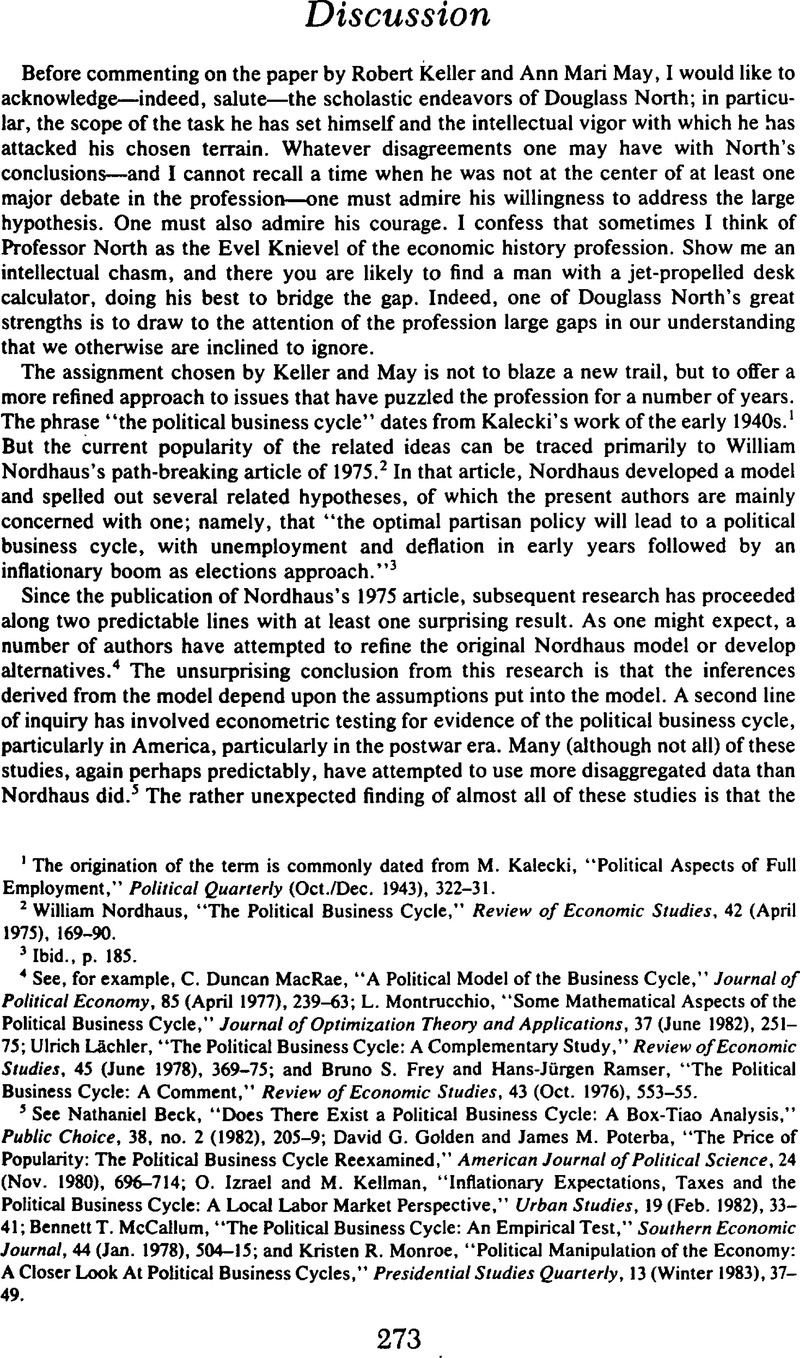No CrossRef data available.
Article contents
Discussion
Published online by Cambridge University Press: 03 March 2009
Abstract

Information
- Type
- Papers Presented at the Forty-Third Annual Meeting of the Economic History Association
- Information
- Copyright
- Copyright © The Economic History Association 1984
References
2 Nordhaus, William, “The Political Business Cycle,” Reviews of Economic Studies, 42 (04 1975), 169–90.CrossRefGoogle Scholar
3 Ibid., p. 185.
4 See, for example, MacRae, C. Duncan, “A Political Model of the Business Cycle,” Journal of Political Economy, 85 (04 1977), 239–63;CrossRefGoogle ScholarMontrucchio, L., “Some Mathematical Aspects of the Political Business Cycle”, Journal of Optimization Theory and Applications, 37 (06 1982), 251–75;CrossRefGoogle ScholarLächler, Ulrich, “The Political Business Cycle: A Complementary Study”, Review of Economic Studies, 45 (06 1978), 369–75;CrossRefGoogle Scholar and Frey, Bruno S. and Ramser, Hans-Jürgen, “The Political Business Cycle: A Comment”, Review of Economic Studies, 43 (10. 1976), 553–55.CrossRefGoogle Scholar
5 See Beck, Nathaniel, “Does There Exist a Political Business Cycle: A Box-Tiao Analysis,” Public Choice, 38, no. 2 (1982), 205–9;CrossRefGoogle ScholarGolden, David G. and Poterba, James M., “The Price of Popularity: The Political Business Cycle Reexamined,” American Journal of Political Science, 24 (11. 1980), 696–714;CrossRefGoogle ScholarIzrael, O. and Kellman, M., “Inflationary Expectations, Taxes and the Political Business Cycle: A Local Labor Market Perspective,” Urban Studies, 19 (02. 1982), 33–41;CrossRefGoogle ScholarMcCallum, Bennett T., “The Political Business Cycle: An Empirical Test,” Southern Economic Journal, 44 (01 1978), 504–15;CrossRefGoogle Scholar and Monroe, Kristen R., “Political Manipulation of the Economy: A Closer Look At Political Business Cycles,” Presidential Studies Quarterly, 13 (Winter 1983), 37–49.Google Scholar
6 Tufte, Edward R., Political Control of The Economy (Princeton, 1978).Google Scholar
7 See, for example, Monroe, “Political Manipulation,” p. 40.Google Scholar
8 Nordhaus, “Political Business Cycle,” p. 187.Google Scholar
9 Barber, James D., The Presidential Character: Predicting Performance in the White House (Englewood Cliffs, 1977, 1972).Google Scholar
10 Review by Mazlish, Bruce, New York Times Book Review, Oct. 1, 1972, p. 32.Google Scholar See also George, Alexander, “Assessing Presidential Character,” World Politics, 41 (01. 1974), 234–82;CrossRefGoogle ScholarHargrove, Erwin, “Presidential Personality and Revisionist Views of the Presidency,” Midwest Journal of Political Science, 17 (11. 1973), 819–35;CrossRefGoogle ScholarTulis, Jeffrey, “On Presidential Character and Abraham Lincoln,” in Rethinking the Presidency, ed. Cronin, Thomas (Boston, 1982), pp. 87–102;Google Scholar and Nelson, Michael, “James David Barber and the Psychological Presidency,” in Rethinking the Presidency, pp. 75–86.Google Scholar
11 The Memories of Richard Nixon (New York, 1978), p. 521; quoted by Keller and May, p. 19 of original paper.Google Scholar

